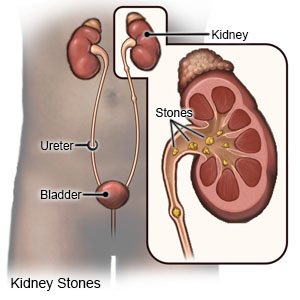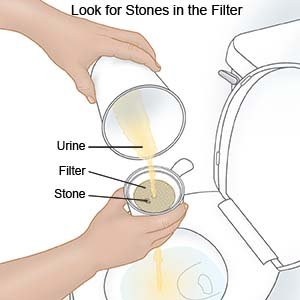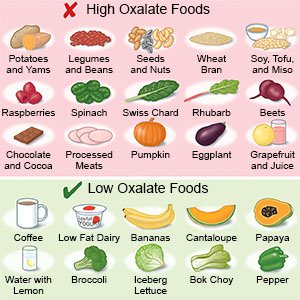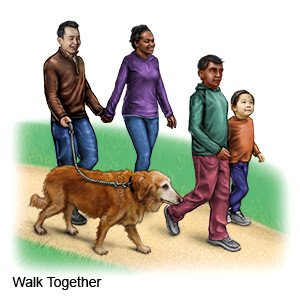Kidney Stones in Children
Medically reviewed by Drugs.com. Last updated on Apr 6, 2025.
AMBULATORY CARE:
Kidney stones
form in the urinary system when the water and waste in your child's urine are out of balance. When this happens, certain types of waste crystals separate from the urine. The crystals build up and form kidney stones. Kidney stones can be made of uric acid, calcium, phosphate, or oxalate crystals. Your child may have more than one kidney stone.
 |
Common symptoms include the following:
- Pain in the middle of your child's back that moves across to his or her side or that may spread to the groin
- Nausea and vomiting
- Urge to urinate often, burning feeling when your child urinates, or pink or red urine
- Tenderness in your lower back, side, or stomach
Seek care immediately if:
- Your child cannot stop vomiting.
Call your child's doctor or kidney specialist if:
- Your child has a fever.
- Your child has trouble urinating.
- You see blood in your child's urine.
- Your child has severe pain.
- You have any questions or concerns about your child's condition or care.
Treatment for kidney stones
may include any of the following:
- NSAIDs , such as ibuprofen, help decrease swelling, pain, and fever. This medicine is available with or without a doctor's order. NSAIDs can cause stomach bleeding or kidney problems in certain people. If your child takes blood thinner medicine, always ask if NSAIDs are safe for him or her. Always read the medicine label and follow directions. Do not give these medicines to children younger than 6 months without direction from a healthcare provider.
- Prescription pain medicine may be given. Ask your child's healthcare provider how to give this medicine safely. Some prescription pain medicines contain acetaminophen. Do not give your child other medicines that contain acetaminophen without talking to a healthcare provider. Too much acetaminophen may cause liver damage. Prescription pain medicine may cause constipation. Ask your child's provider how to prevent or treat constipation.
- Do not give aspirin to children younger than 18 years. Your child could develop Reye syndrome if he or she has the flu or a fever and takes aspirin. Reye syndrome can cause life-threatening brain and liver damage. Check your child's medicine labels for aspirin or salicylates.
- Medicines to balance your child's electrolytes may be needed.
- A procedure or surgery to remove the kidney stones may be needed if they do not pass on their own. Your child's treatment will depend on the size and location of the stones, and your child's age.
Treatment options
The following list of medications are related to or used in the treatment of this condition.
What you can do to manage your child's kidney stones:
- Offer your child more liquids. Your child's healthcare provider may tell you to have your child drink at least 8 to 12 (eight-ounce) cups of liquids each day. This helps flush out the kidney stones when your child urinates. Water is the best liquid to drink.
- Strain your child's urine every time he or she goes to the bathroom. Have your child urinate through a strainer or a piece of thin cloth to catch the stones. Take the stones to your child's provider so they can be sent to a lab for tests. This will help your healthcare providers plan the best treatment for your child.

- Ask if your child should avoid any foods. He or she may need to limit oxalate. Oxalate is a chemical found in some plant foods. The most common type of kidney stone is made up of crystals that contain calcium and oxalate. Your child's provider or dietitian may recommend limiting oxalate if your child gets this type of kidney stone often. You may need to limit how much sodium (salt) or protein your child eats. Ask for information about the best foods for your child.

- Encourage your child to be physically active. Physical activity helps the stones pass more easily. Ask about the best activities for your child.

After your child passes the kidney stones:
Your child's healthcare provider may order a 24-hour urine test. Results from a 24-hour urine test will help the provider plan ways to prevent more stones from forming. Your child's provider will give you more instructions.
Follow up with your child's doctor as directed:
Write down your questions so you remember to ask them during your child's visits.
© Copyright Merative 2025 Information is for End User's use only and may not be sold, redistributed or otherwise used for commercial purposes.
The above information is an educational aid only. It is not intended as medical advice for individual conditions or treatments. Talk to your doctor, nurse or pharmacist before following any medical regimen to see if it is safe and effective for you.
Learn more about Kidney Stones
Treatment options
Symptoms and treatments
Medicine.com guides (external)
Further information
Always consult your healthcare provider to ensure the information displayed on this page applies to your personal circumstances.
